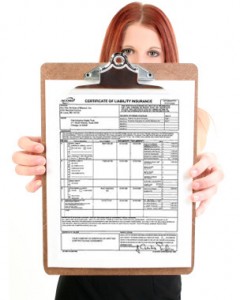Certificates of Insurance Law
 The Massachusetts Division of Insurance (DOI) issued a bulletin to provide guidance on the implementation of Massachusetts General Laws Chapter 175L, concerning the issuance of certificates of insurance.
The Massachusetts Division of Insurance (DOI) issued a bulletin to provide guidance on the implementation of Massachusetts General Laws Chapter 175L, concerning the issuance of certificates of insurance.
Chapter 175L was signed into law on Jan. 7, 2015, by then-Gov. Deval Patrick and became effective on April 7, 2015. The DOI stated in its bulletin 2015-02 on May 8 that the purpose of this new law is to regulate and standardize the practice of using certificates of insurance.
Chapter 175L defines a certificate of insurance as “a document or instrument, regardless of how titled or described, that is prepared or issued by an insurer or insurance producer as evidence of property or casualty insurance coverage.” The bulletin notes that the term shall not include a policy of insurance, insurance binder, policy endorsement or automobile insurance identification or information card. Chapter 175L explicitly regulates certificates of insurance for the first time in Massachusetts.
The new law codifies the long-time rule that insurance certificates may not modify the terms or conditions of the underlying insurance policies that they evidence. In this regard, Chapter 175L requires that all certificates of insurance must be both true and accurately reflect the policy they represent, and mandates that no one may knowingly prepare, issue or require the issuance of a certificate of insurance that contains any false or misleading information or that alters, amends or extends the coverage provided by the underlying referenced policy.
The new law applies to all certificates issued in connection with property, operations or risks located in Massachusetts, regardless of where the certificate holder, policyholder, insurer, or insurance agent is located.
The bulletin further stated that a certificate of insurance that violates the requirement of Chapter 175L will be deemed to be null and void. Under the law, the insurance commissioner is authorized to examine and investigate the activities of any person that the commissioner reasonably believes has been or currently is engaged in an act prohibited by Chapter 175L. Additionally, Chapter 175L grants the commissioner the authority to enforce the law by imposing a fine of up to $500 per violation.
Key provisions of Chapter 175L are as follows:
 Serving the public is a serious, round-the-clock responsibility. It’s your job to protect, plan for, and serve the needs of your community as it grows. And it’s our job to protect you with thoughtfully designed, tailored insurance coverages. Our dedicated underwriting, claims and risk control teams work specifically with water and sewer districts and can provide you with one source for your insurance and risk management needs.
Serving the public is a serious, round-the-clock responsibility. It’s your job to protect, plan for, and serve the needs of your community as it grows. And it’s our job to protect you with thoughtfully designed, tailored insurance coverages. Our dedicated underwriting, claims and risk control teams work specifically with water and sewer districts and can provide you with one source for your insurance and risk management needs.